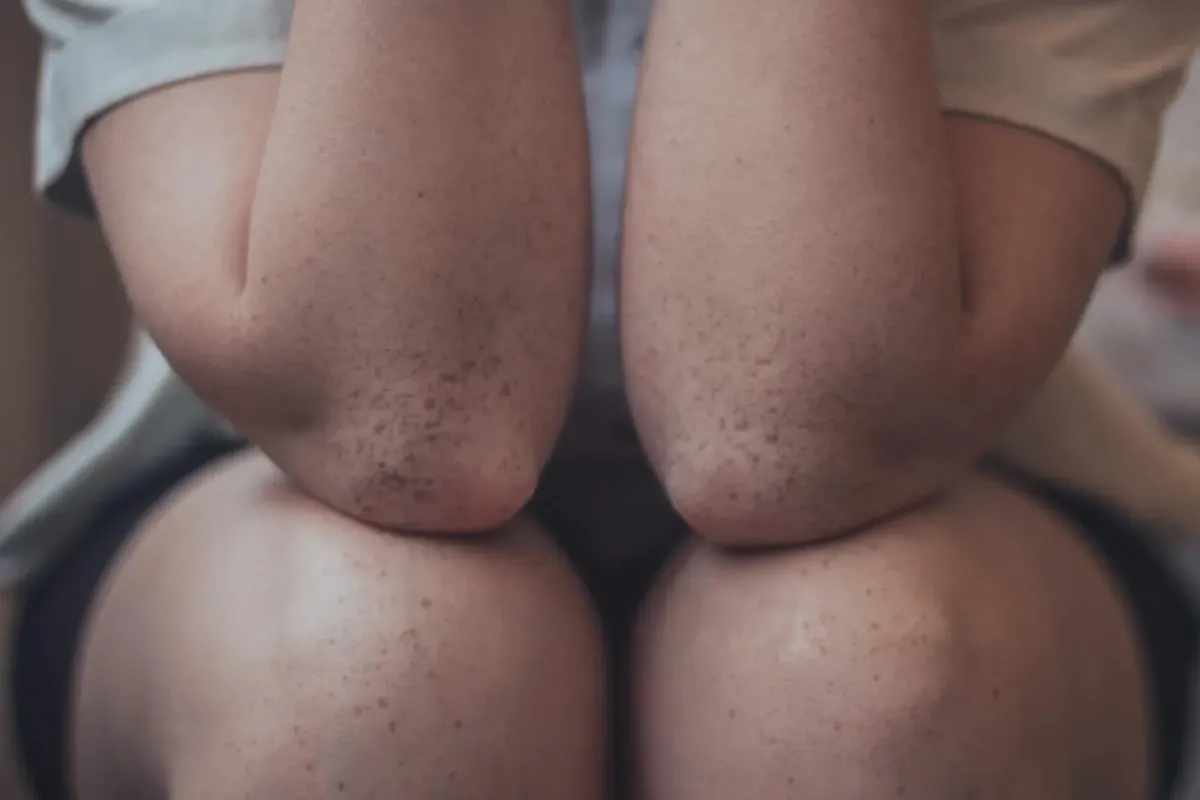READ UP ON THE LATEST HORMONE AND THYROID NEWS!

Does hypothyroidism cause joint pain?
Joint pain is a common complaint that I hear from clients, but one that often isn’t associated with hypothyroidism.
But can a slow thyroid cause aches and pains in the body?
The short answer: yes!
Let’s talk about how and why this happens.
What causes a slow thyroid?
There are a lot of common causes of hypothyroidism in women. It can of course be genetic, but more and more I’m seeing women with hypothyroidism caused by lifestyle and environmental factors.
Some of these factors can include stress, poor diets, other organs and systems like the gut or liver not functioning properly, and more.
These lifestyle and environmental factors then build up and cause the thyroid to slow down. This is when we start seeing many common symptoms of hypothyroidism, such as weight gain, anxiety, and hair loss.
And, of course, it can also manifest as joint pain. There are a couple of reasons for this.
Joint pain & hypothyroidism
Joint pain can be a symptom of hypothyroidism when there’s an excess amount of calcium in the body. Too much calcium can cause the thyroid to slow down, move to our joints and muscles, and calcify, leading to aches and pains.
It can be because of inflammation. Inflammation can be caused by food, chronic stress, environmental toxins, or poor sleep. Inflammation in the body bogs down the thyroid, and one of the signs that the body is dealing with inflammation is achy joints.
Finally, it can be because you actually have Hashimoto’s disease, which is the autoimmune version of hypothyroidism. Your body is attacking the thyroid hormones because it thinks they are invading cells that aren’t supposed to be there. It’s your body literally attacking itself, which can then lead to pain in all sorts of places, including the joints.
If you want to know more about each of these causes of hypothyroidism & joint pain, I have a YouTube video that dives deep into each one of these. Check it out here.
What to do if your joints are achy
If you’re having a lot of joint pain combined with other thyroid symptoms, such as weight gain, hair loss, and anxiety, it’s time to get your thyroid tested.
Remember, get a full thyroid panel to see everything that’s going on. And I recommend following up with a Hair Tissue Mineral Analysis to really get a complete picture as to the changes you need to make to get your thyroid (and joints) back on track.
If you need help with any of that, please reach out to me.

Does hypothyroidism cause joint pain?
Joint pain is a common complaint that I hear from clients, but one that often isn’t associated with hypothyroidism.
But can a slow thyroid cause aches and pains in the body?
The short answer: yes!
Let’s talk about how and why this happens.
What causes a slow thyroid?
There are a lot of common causes of hypothyroidism in women. It can of course be genetic, but more and more I’m seeing women with hypothyroidism caused by lifestyle and environmental factors.
Some of these factors can include stress, poor diets, other organs and systems like the gut or liver not functioning properly, and more.
These lifestyle and environmental factors then build up and cause the thyroid to slow down. This is when we start seeing many common symptoms of hypothyroidism, such as weight gain, anxiety, and hair loss.
And, of course, it can also manifest as joint pain. There are a couple of reasons for this.
Joint pain & hypothyroidism
Joint pain can be a symptom of hypothyroidism when there’s an excess amount of calcium in the body. Too much calcium can cause the thyroid to slow down, move to our joints and muscles, and calcify, leading to aches and pains.
It can be because of inflammation. Inflammation can be caused by food, chronic stress, environmental toxins, or poor sleep. Inflammation in the body bogs down the thyroid, and one of the signs that the body is dealing with inflammation is achy joints.
Finally, it can be because you actually have Hashimoto’s disease, which is the autoimmune version of hypothyroidism. Your body is attacking the thyroid hormones because it thinks they are invading cells that aren’t supposed to be there. It’s your body literally attacking itself, which can then lead to pain in all sorts of places, including the joints.
If you want to know more about each of these causes of hypothyroidism & joint pain, I have a YouTube video that dives deep into each one of these. Check it out here.
What to do if your joints are achy
If you’re having a lot of joint pain combined with other thyroid symptoms, such as weight gain, hair loss, and anxiety, it’s time to get your thyroid tested.
Remember, get a full thyroid panel to see everything that’s going on. And I recommend following up with a Hair Tissue Mineral Analysis to really get a complete picture as to the changes you need to make to get your thyroid (and joints) back on track.
If you need help with any of that, please reach out to me.

CALL US TODAY! (314) 226-3137
Content, including images, displayed on this website is protected by copyright laws. Downloading, republication, retransmission or reproduction of content on this website.

